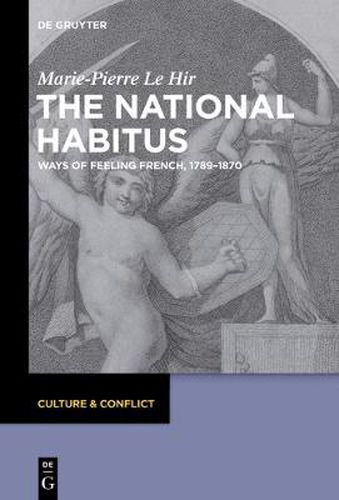Readings Newsletter
Become a Readings Member to make your shopping experience even easier.
Sign in or sign up for free!
You’re not far away from qualifying for FREE standard shipping within Australia
You’ve qualified for FREE standard shipping within Australia
The cart is loading…






This title is printed to order. This book may have been self-published. If so, we cannot guarantee the quality of the content. In the main most books will have gone through the editing process however some may not. We therefore suggest that you be aware of this before ordering this book. If in doubt check either the author or publisher’s details as we are unable to accept any returns unless they are faulty. Please contact us if you have any questions.
Stories about border crossers, illegal aliens, refugees that regularly appear in the press everywhere point to the crucial role national identity plays in human beings’ lives today. The National Habitus seeks to understand how and why national belonging became so central to a person’s identity and sense of identity. Centered on the acquisition of the national habitus, the process that transforms subjects into citizens when a state becomes a nation-state, the book examines this transformation at the individual level in the case of nineteenth century France. Literary texts serve as primary material in this study of national belonging, because, as Germaine de Stael pointed out long ago, literature has the unique ability to provide access to inner feelings. The term habitus, in the title of this book, signals a departure from traditional approaches to nationalism, a break with the criteria of language, race, and ethnicity typically used to examine it. It is grounded instead in a sociology that deals with the subjective dimension of life and is best exemplified by the works of Norbert Elias (1897-1990) and Pierre Bourdieu (1931-2002), two sociologists who approach belief systems like nationalism from a historical, instead of an ethical vantage point. By distinguishing between two groups of major French writers, three who experienced the 1789 Revolution firsthand as adults (Olympe de Gouges, Francois Rene de Chateaubriand and Germaine de Stael) and three who did not (Stendhal, Prosper Merimee, and George Sand), the book captures evolving understandings of the nation, as well as thoughts and emotions associated with national belonging over time. Le Hir shows that although none of these writers is typically associated with nationalism, all of them were actually affected by the process of nationalization of feelings, thoughts, and habits, irrespective of aesthetic preferences, social class, or political views. By the end of the nineteenth century, they had learned to feel and view themselves as French nationals; they all exhibited the characteristic features of the national habitus: love of their own nation, distrust and/or hatred of other nations. By underscoring the dual contradictory nature of the national habitus, the book highlights the limitations nation-based identities impose on the prospect for peace.
$9.00 standard shipping within Australia
FREE standard shipping within Australia for orders over $100.00
Express & International shipping calculated at checkout
This title is printed to order. This book may have been self-published. If so, we cannot guarantee the quality of the content. In the main most books will have gone through the editing process however some may not. We therefore suggest that you be aware of this before ordering this book. If in doubt check either the author or publisher’s details as we are unable to accept any returns unless they are faulty. Please contact us if you have any questions.
Stories about border crossers, illegal aliens, refugees that regularly appear in the press everywhere point to the crucial role national identity plays in human beings’ lives today. The National Habitus seeks to understand how and why national belonging became so central to a person’s identity and sense of identity. Centered on the acquisition of the national habitus, the process that transforms subjects into citizens when a state becomes a nation-state, the book examines this transformation at the individual level in the case of nineteenth century France. Literary texts serve as primary material in this study of national belonging, because, as Germaine de Stael pointed out long ago, literature has the unique ability to provide access to inner feelings. The term habitus, in the title of this book, signals a departure from traditional approaches to nationalism, a break with the criteria of language, race, and ethnicity typically used to examine it. It is grounded instead in a sociology that deals with the subjective dimension of life and is best exemplified by the works of Norbert Elias (1897-1990) and Pierre Bourdieu (1931-2002), two sociologists who approach belief systems like nationalism from a historical, instead of an ethical vantage point. By distinguishing between two groups of major French writers, three who experienced the 1789 Revolution firsthand as adults (Olympe de Gouges, Francois Rene de Chateaubriand and Germaine de Stael) and three who did not (Stendhal, Prosper Merimee, and George Sand), the book captures evolving understandings of the nation, as well as thoughts and emotions associated with national belonging over time. Le Hir shows that although none of these writers is typically associated with nationalism, all of them were actually affected by the process of nationalization of feelings, thoughts, and habits, irrespective of aesthetic preferences, social class, or political views. By the end of the nineteenth century, they had learned to feel and view themselves as French nationals; they all exhibited the characteristic features of the national habitus: love of their own nation, distrust and/or hatred of other nations. By underscoring the dual contradictory nature of the national habitus, the book highlights the limitations nation-based identities impose on the prospect for peace.